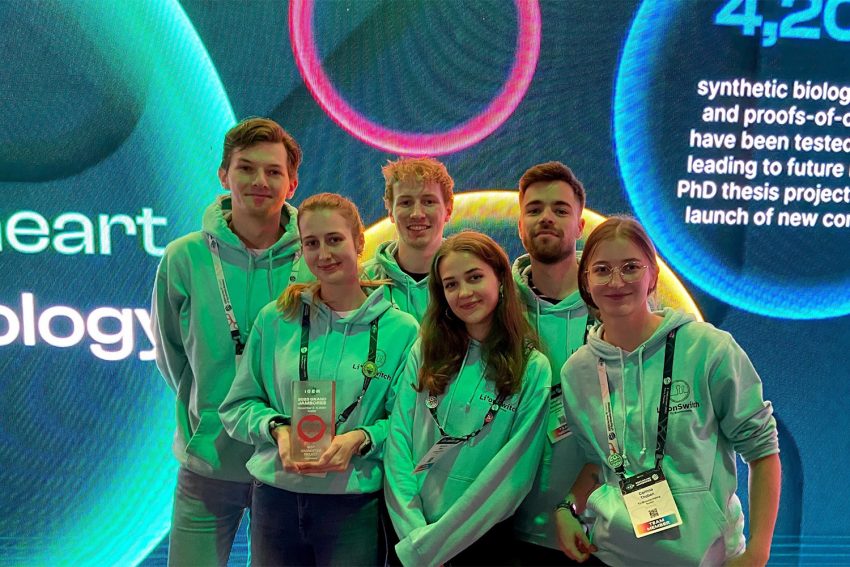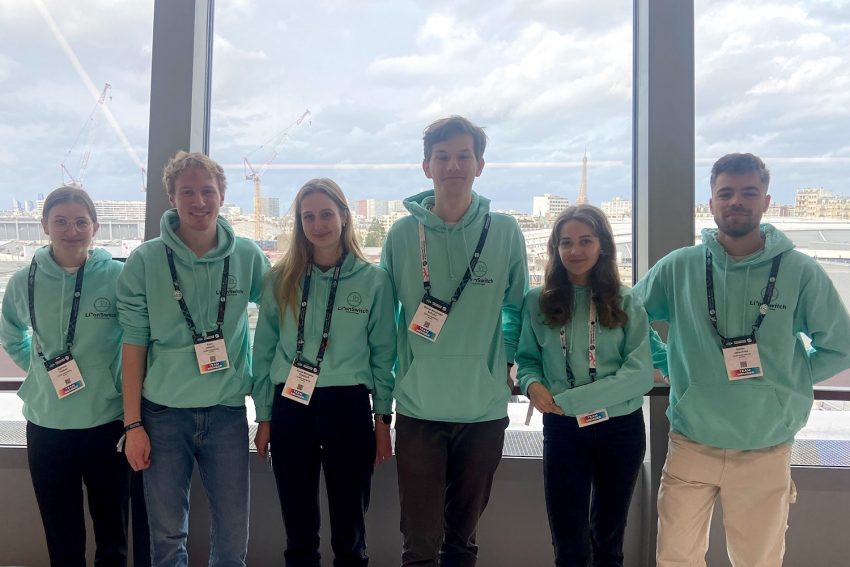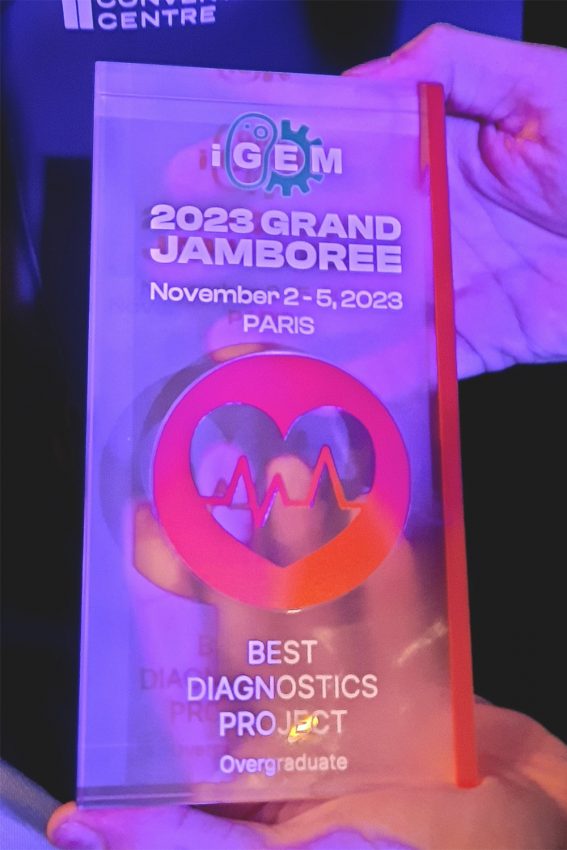In Paris: Great success for the Braunschweig team Young researchers win awards at the iGEM competition for synthetic biology
The “international Genetically Engineered Machine (iGEM) competition” is the largest international competition in synthetic biology for students from the life and natural sciences. It aims to combine biological materials with engineering concepts. This year, over 400 teams from 66 countries competed against each other in Paris. The competition promotes international contacts with other teams and interdisciplinary skills. The Braunschweig team travelled to the Grand Jamboree in Paris at the beginning of November to present their research results to other teams, researchers, journalists and companies from all over the world and to face the jury.

The iGEM team from TU Braunschweig with their ‘Best Diagnostics Project’ award at the Grand Jamboree in Paris: Daniel Schulze, Ronja Friedhoff, Felix Jarecki, Susanna Pape, Stefan Jakschies, Corinna Thoben. Photo credit: iGEM
The TU Braunschweig team was one of the ten best teams and won first place in the “Best Diagnostics Project” category for its project in diagnostic application. The team was also nominated for the “Best New Composite Part” prize, which rewards the creation of a complex DNA building block.
“I think this award was a moment we will never forget,” says Susanna Pape, who presented the “Li+onSwitch” project together with Ronja Friedhoff. “We hadn’t expected such a fantastic result. Our hard work has really paid off.”
The team

Corinna Thoben, Felix Jarecki, Ronja Friedhoff, Daniel Schulze, Susanna Pape, Stefan Jakschies at the Grand Jamboree in Paris. Photo credit: iGEM
This year’s iGEM team from TU Braunschweig, consisting of biology students Ronja Friedhoff, Josefine Huth, Stefan Jakschies, Felix Jarecki, Susanna Pape, Daniel Schulze, Corinna Thoben and Alida Wefers, was founded by Prof. Boas Pucker from the Institute of Plant Biology. He has been familiar with the competition since 2014, has accompanied several teams during their participation and was able to inspire some students this time as well: “I think this is an opportunity for me to improve my skills and gain a lot of experience, especially skills that we don’t learn in our regular modules,” said Felix Jarecki. “It’s great to be able to put your own ideas into practice.”
The students were supported by Benjamin Harder, Michael Burgis and Katharina Wolff, who had already gained iGEM experience in previous years.
The “Li+onSwitch” project: application- and demand-orientated
The iGEM team’s project focuses on measuring lithium concentrations in patient samples and developing a minimally invasive and cell-free system. Lithium medication is often prescribed to patients suffering from bipolar disorder (also known as biopolar disorder). Lithium stabilises mood swings. However, because the level of lithium in the blood needs to be kept at a very precise level, blood samples are taken at regular visits to the doctor and sent to a laboratory for lithium quantification. This is where the team’s test system comes in, which aims to reduce the burden on both the healthcare system and patients. Discussions with many experts have confirmed that there is a demand for such a system.
For the practical implementation, the team combined various genetic building blocks, including a lithium-sensitive riboswitch (as an on/off switch) and a gene for a nanoluciferase, a light-generating protein.
Read out and document data with a smartphone
A special feature here is the use of a cell-free system, which means that users do not come into contact with genetically modified organisms.
Ronja Friedhoff: “This generates a signal that depends on the lithium concentration, which users can read out independently and at home using their smartphone.”
The measured values can then be documented using a specially developed software prototype.
Practical implications and ethical issues
Throughout the research project, the team consulted a wide range of experts, professionals and organisations to better understand the practical implications and ethical dimensions of the project.

Paris 2023: The iGEM team from TU Braunschweig was one of the ten best teams and won first place in the “Best Diagnostics Project” category for its project in diagnostic application. Photo credit: iGEM
“These individuals and groups have provided the team with valuable knowledge and perspectives that have influenced the project in many ways,” says Daniel Schulze.
The team also had to raise funds, laboratory equipment and materials for their project independently. Important support came from the Ecki Wohlgehagen Foundation, the Braunschweig Community Foundation, the Braunschweig University Association and numerous companies.
The great result and the feedback from many experts motivated some team members to continue working on their “Li+onSwitch” project even after the end of the iGEM competition.
Some students have already expressed their interest in a new project for next year. If you are interested in participating, please contact pbb@tu-bs.de.

